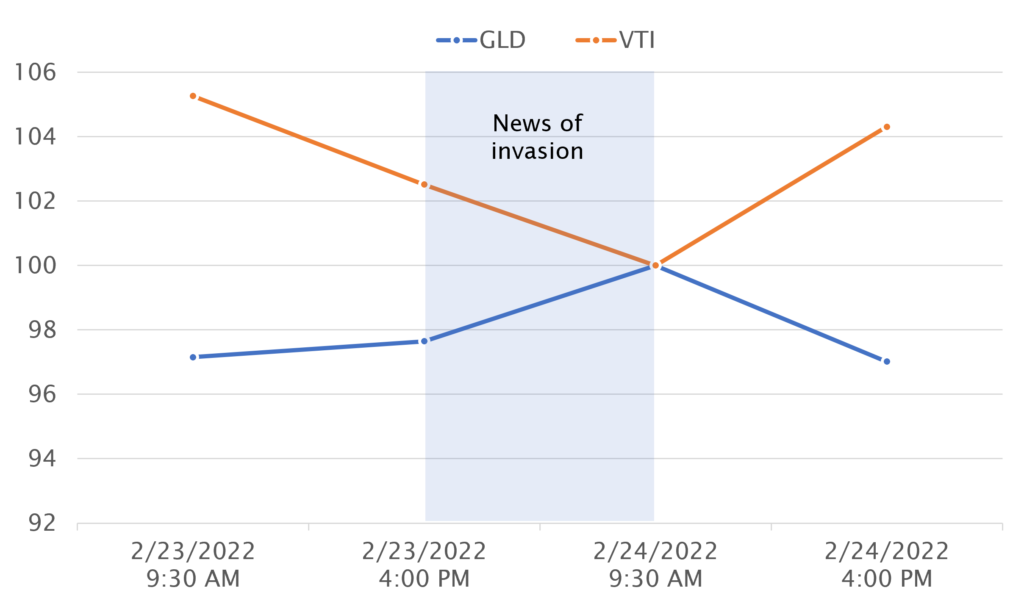If you’ve read the news recently, then you’re well aware that Russia invaded Ukraine. I’m not going to comment on geopolitics in this post, mostly because I’m no expert (although I do have my opinions). My focus here is more on what investors should consider and what actions they should take (or not take) in this new environment.
If you haven’t already, make a plan
It might go without saying, but if you haven’t made a plan for your investments, make one now. If you need help getting started, read my post here. I can’t stress this enough… without a solid plan, plotting your financial path will be extremely difficult. Planning will help you maintain discipline when things get tough.
If you already have your investment plan in place, good work! Keep it handy.
Ignore the financial media
At this point, things are so fluid and information so incomplete that it’s difficult to take any reasonable actions in response to what is going on. Markets are moving fast as well, so it’s best to stay out of the way and let the day traders, hedge funds, and quantitative market makers beat each other up.
Take a look at this chart comparing gold (GLD) with stocks (VTI) immediately before and after the invasion started:

Conventional thinking would suggest that news of the invasion would have continued the sell off in stocks and the price rally in gold. And that’s what happened during the overnight hours. When markets opened up on the morning of the 24th, gold was higher and stocks had sold off significantly. But then everything promptly reversed. By the end of the day on the 24th, there was a broad rally in stocks and gold was sold (I couldn’t resist the rhyme).
In reality, not all that much had changed in those 24 hours. Russia was widely expected to take some sort of military action, and that’s what they did. As it tends to do, the market overcorrected in anticipation of future events, and then whipsawed around. Trying to anticipate these market movements is a tough game to win. If you did come out ahead, don’t get too excited. Luck was likely the reason.
Keep inflation in mind
Inflation should be top of mind for every investor in this environment. Russia is a massive supplier of commodities including oil, natural gas, wheat, and aluminum. Any impingement on the flow of these goods could lead to additional inflationary pressure in the global economy. However, higher inflation is certainly not guaranteed. The best course of action is to have a plan in place to protect yourself.
Don’t focus on the day to day
I like to preach ad nauseam about taking a long-term perspective when it comes to investing, but it’s tremendously important. Daily market price action is akin to chaos. The markets constantly take in new information and update price expectations in a rapid fashion. And much of these price action is noise. Only over long periods of time can we see the underlying effects of new technologies, improved productivity, and higher economic output.
Stay Optimistic
The final thing I would like to mention is optimism needs to be your default mode as an investor. Things may look bleak at times. When terms like “World War III” or “nuclear war” start getting thrown around, people tend to get nervous. But investing represents the very essence of optimism. After all, if you don’t believe the future will be better than today, then there is not much reason to save and invest.
So keep your eyes on the horizon and don’t be afraid to dream big. If you need a little inspiration, here is a good article about how we can start adopting an “abundance agenda” to fix some of our problems. And when faced with difficult circumstances, let’s all hope we can emulate the courage and conviction of Volodymyr Zelenskyy, the President of Ukraine. Staring down an aggressive and fearsome opponent, and offered an opportunity to evacuate, Zelenskyy said, “The fight is here; I need ammunition, not a ride.” Courage like that can seem rare these days, but it’s not extinct. Together, we can all work to cultivate a spirit of fortitude and a sense of optimism, even in the face of danger and uncertainty.

